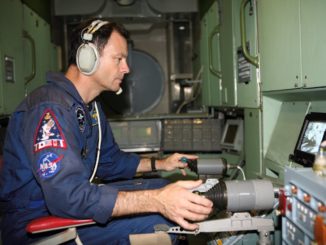Science
Axiom Space Selects Emiliano Ventura as First ‘Project Astronaut’

Axiom Space has appointed Portuguese physiologist Emiliano Ventura as the inaugural leader of its new initiative, “Project Astronaut.” Announced during the 2025 International Astronautical Congress on Tuesday, this program aims to enhance astronaut training protocols as Axiom prepares to launch the first module of its commercial space station next year.
Ventura, who serves as the director of the Motor & Sport Institute (MSI) Bio Performance Center, will develop a six-month training program that integrates his expertise in physiology and sports science. “I am honored to participate in Axiom Space’s first Project Astronaut initiative, combining my expertise in human performance with astronaut training,” he stated. Ventura further emphasized that the program is designed to advance scientific research while inspiring both the people of Portugal and the global community to engage with the future of space exploration.
The collaboration between Axiom Space and MSI is not new; the two organizations have worked together since at least Axiom Mission 3, which launched in January 2024. As part of Project Astronaut, Ventura’s training regimen will incorporate various elements, including centrifuges, parabolic flights, altitude chambers, outdoor leadership exercises, and spacesuit operations training.
Innovative Training for Future Missions
Ventura’s goal is to gain insights into how the human body adapts to microgravity conditions, leveraging his extensive background in the field. Michael López-Alegría, Axiom Space’s Chief Astronaut, remarked, “Project Astronaut embodies Axiom Space’s dedication to mission readiness and continuous improvement. Emiliano is the perfect candidate to lead this pilot program given his unique combination of expertise in human performance and extensive experience training previous crew members.”
The initiative will not only enhance Axiom’s training protocols but will also involve seasoned astronauts such as Peggy Whitson and Koichi Wakata, who will train alongside Ventura throughout the program. López-Alegría confirmed that at least one of them will participate in each training event, underscoring Axiom’s commitment to ensuring safe, effective, and inspiring commercial space missions.
As the International Space Station approaches the end of its operational lifespan, the specifics of Ventura’s potential flight remain uncertain. There are discussions surrounding whether he will travel to the ISS or to a future Axiom Station once it becomes operational. Meanwhile, NASA is currently evaluating plans for its fifth and sixth private astronaut missions to the ISS. Axiom Space has secured contracts for the first four missions, with Axiom Mission 4 concluding in mid-July.
The establishment of Project Astronaut marks a significant step for Axiom Space in its efforts to refine astronaut training methods, setting a foundation for future commercial space endeavors. As Axiom prepares for its ambitious goals, Ventura’s leadership is expected to play a pivotal role in shaping the future of human spaceflight.
-

 Lifestyle5 months ago
Lifestyle5 months agoLibraries Challenge Rising E-Book Costs Amid Growing Demand
-

 Sports4 months ago
Sports4 months agoTyreek Hill Responds to Tua Tagovailoa’s Comments on Team Dynamics
-

 Sports4 months ago
Sports4 months agoLiverpool Secures Agreement to Sign Young Striker Will Wright
-

 Lifestyle4 months ago
Lifestyle4 months agoSave Your Split Tomatoes: Expert Tips for Gardeners
-

 Lifestyle4 months ago
Lifestyle4 months agoPrincess Beatrice’s Daughter Athena Joins Siblings at London Parade
-

 Science4 months ago
Science4 months agoSan Francisco Hosts Unique Contest to Identify “Performative Males”
-

 World4 months ago
World4 months agoWinter Storms Lash New South Wales with Snow, Flood Risks
-

 Science5 months ago
Science5 months agoTrump Administration Moves to Repeal Key Climate Regulation
-

 Business5 months ago
Business5 months agoSoFi Technologies Shares Slip 2% Following Insider Stock Sale
-

 Science5 months ago
Science5 months agoNew Tool Reveals Link Between Horse Coat Condition and Parasites
-

 Sports4 months ago
Sports4 months agoElon Musk Sculpture Travels From Utah to Yosemite National Park
-

 Science5 months ago
Science5 months agoNew Study Confirms Humans Transported Stonehenge Bluestones









